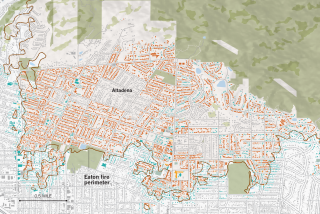Killings in L.A. are still on the rise, but police chief sees a ‘turn of the tide’

- Share via
After struggling for months to quell violent crime in some of Los Angeles’ hardest-hit neighborhoods, LAPD Chief Charlie Beck said Tuesday that the rise of killings had slowed in the city, indicating that “a turn of the tide” had begun.
In his weekly crime report to the Police Commission, Beck said the city had seen 101 homicides this year — “almost even” with the 97 killings recorded at this time in 2015.
The 4.1% increase, he noted, was much lower than it had been earlier this year. In early March, LAPD figures showed homicides were up more than 25% compared with the same period last year.
Calling the progress “very important,” Beck said the city was “firmly on track” to see fewer than 300 homicides this year. Last year, 283 people were killed in the city.
See the most-read stories this hour >>
We took some extreme steps ... and those steps are starting to have some effect. Although it’s not over ‘til it’s over, obviously.
— LAPD Chief Charlie Beck
The chief noted that other major cities have seen significant upticks in violence this year, particularly Chicago, where nearly 1,400 people have been shot. By comparison, 427 people have been shot this year in Los Angeles, Beck said, noting that the pace of shootings has also slowed in recent months.
“That’s 427 too many, but it is a significant reduction from where we were just several months ago,” he said.
The LAPD’s focus on neighborhoods most affected by homicides and other violent crime appeared to be paying off, Beck said. The department has shifted extra resources to four divisions — all in South L.A. — that have suffered most from the city’s violent crime increases.
“We took some extreme steps to address the four most violent divisions earlier in the year, and those steps are starting to have some effect,” the chief told the police commissioners. “Although it’s not over ‘til it’s over, obviously.”
Join the conversation on Facebook >>
The department had been struggling to contain a surge in crime, particularly killings, after more than a decade of steep declines. Last year, all categories of crime rose across the city, with violent offenses jumping by 20.2% and property crime by more than 10% compared with 2014. It marked the second year in a row that violent crime rose, but the first time since 2003 that both violent and property crime rose.
The number of homicides in L.A. has risen slightly in recent years, after plummeting to a decades-low in 2013, when 251 people were killed. The city saw 260 homicides in 2014; a number that rose to 283 last year.
This year, other areas of violent crime remained at double-digit increases, according to recently published LAPD data. Robberies jumped 15.6% through May 14 when compared with the same time period in 2015. Aggravated assaults rose 19.3% during that time, with overall violent crime up 15.7%.
Property crime rose slightly more than 2% during the same time period, resulting in an overall crime increase of 4.8%.
Addressing reporters on Tuesday, Beck noted that the LAPD deployed more officers from the recently expanded Metropolitan Division — an elite unit now focused on suppressing crime in hot spots across the city — to help the four divisions hardest hit by the violence. The department has also set up an operations center to allow LAPD brass to better coordinate their crime-fighting efforts.
Those efforts, Beck said, have helped police “dispatch resources more quickly and try to stay ahead of problems.”
“The key to reducing homicides in Los Angeles is not only prevention of the first homicide,” Beck said, “but it’s more importantly the prevention of retaliation homicides, the second and third homicides that can occur.”
Deputy Chief Bill Scott, who heads the LAPD’s South Bureau, said the operations center has played a key role in reducing slayings since it was established in mid-March. Based in the LAPD’s downtown headquarters, the center is staffed around-the-clock by LAPD commanders who analyze real-time crime numbers and create strategies for how to respond to problem spots.
“They’re getting information in real time. In a normal process, there’s a series of phone calls, lag time,” Scott said. “Now the decisions are quicker, and sometimes that means saving lives.”
The operations center has also helped the LAPD focus on specific offenders, Scott said, rather than “blanket the community with cops on every corner.” Instead, he said, police can look for known criminals with outstanding warrants or illegal guns in an effort to prevent violent crime.
Scott pointed to the LAPD’s Southwest Division, which saw a rash of killings early in the year that drew concern from residents and LAPD brass. The division — which includes neighborhoods such as Baldwin Hills, Leimert Park and Exposition Park — had seen nine homicides by the time the operations center was set up, Scott said. Since then, he said, five people have been killed.
But, he cautioned, although police have made progress in reducing the number of killings and shootings, other crimes, such as robberies, are still on the rise.
“It’s still not where we want to be,” he said. “The shootings — we feel good about where we’re at. But there’s work to be done.”
ALSO
Four men arrested on drug and weapons violations at suspected motorcycle gang meet
San Diego cracks down on ‘spice’
Cal State trustees agree to boost faculty salaries, ending yearlong dispute
Follow me on Twitter: @katemather
UPDATES:
6:18 p.m.: This story was updated with comments from LAPD Deputy Chief Bill Scott.
4:28 p.m.: This story was updated to include other LAPD crime statistics.
This story was originally published at 3:59 p.m.
More to Read
Sign up for Essential California
The most important California stories and recommendations in your inbox every morning.
You may occasionally receive promotional content from the Los Angeles Times.











